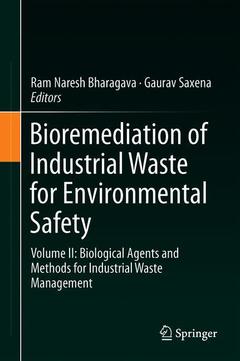Description
Bioremediation of Industrial Waste for Environmental Safety, 1st ed. 2020
Volume II: Biological Agents and Methods for Industrial Waste Management
Coordinators: Bharagava Ram Naresh, Saxena Gaurav
Language: English
Subjects for Bioremediation of Industrial Waste for Environmental Safety:
Support: Print on demand
Description
/li>Contents
/li>Biography
/li>Comment
/li>
Achieving environmental sustainability with rapid industrialization is currently a major global challenge. Industries are the key economic drivers, but are also the main polluters as untreated/partially treated effluents from industry are usually discharged into the aquatic environment or dumped. Industrial effluents often contain highly toxic and hazardous pollutants, which cause ecological damage and present and health hazards to living beings. As such, there is a pressing need to find ecofriendly solutions to deal with industrial waste, and to develop sustainable methods for treating/detoxifying waste before it?s released into the environment. As a low cost and eco-friendly clean technology, bioremediation can offer a sustainable alternative to conventional remediation technologies for the treatment and management of industrial wastes.
This book (Volume II) describes the role of biological agents in the degradation and detoxification of organic and inorganic pollutants in industrial wastes, and presents recent bioremediation approaches for waste treatment and management, such as constructed wetlands, electro- bioremediation and nano-bioremediation, as well as microbial fuel cells. It appeals to students, researchers, scientists, industry professionals and experts in the field of microbiology, biotechnology, environmental sciences, eco-toxicology, environmental remediation and waste management and other relevant areas who are interested in biodegradation and bioremediation of industrial wastes for environmental safety.
Dr. Ram Naresh Bharagava was born in 1977 and completed school education from Government Schools at Lakhimpur Kheri, Uttar Pradesh (UP), India. He received his B.Sc. degree (1998) in Zoology, Botany, and Chemistry from the University of Lucknow, Lucknow, UP, India, and M.Sc. degree (2004) in Molecular Biology and Biotechnology from Govind Ballabh Pant University of Agriculture & Technology (GBPUAT), Pantnagar, Uttarakhand (UK), India. He received his Ph.D. degree (2010) in the area of Microbiology jointly from the Environmental Microbiology Division, Council of Scientific and Industrial Research (CSIR)-Indian Institute of Toxicology Research (IITR), Lucknow, and Pt. Ravishankar Shukla University, Raipur, Chhattisgarh, India. He was a Junior Research Fellow (JRF) during his Ph.D., qualified twice (2002 & 2003) in the CSIR-National Eligibility Test (NET) and once in the Graduate Aptitude Test in Engineering (GATE) in 2003. His major research work during his Ph.D. degree focused on the bacterial degradation of recalcitrant melanoidin from distillery wastewater. He has authored one book entitled Bacterial Metabolism of Melanoidins from Distillery Effluent and edited five books entitled Bioremediation of Industrial Pollutants, Environmental Pollutants and Their Bioremediation Approaches, Emerging and Ecofriendly Approaches for Waste Management, and Recent Trends in Environmental Management and Bioremediation of Industrial Waste for Environmental Safety: Industrial Waste and Its Management (Volume I). He has published more than 117 research items including research/review papers/two book reviews in national and international journals of high impact factor published by Springer Nature, Elsevier, and Taylor & Francis Group. He has also written more than 40 book chapters for national and international edited books. He has published many scientific articles in national and international science magazines. He has presented many papers relevant t
Elucidates the status and nature of industrial waste problem across industries.
Discuses new approaches of industrial waste management via bioremediation and phytoremediation.
Detailed account of successfully utilised green technologies in the industrial waste management




